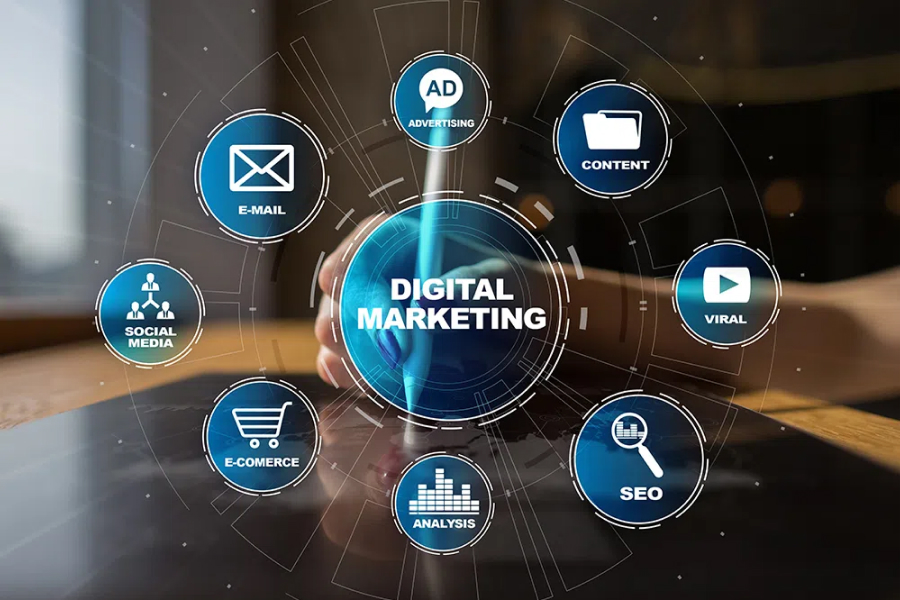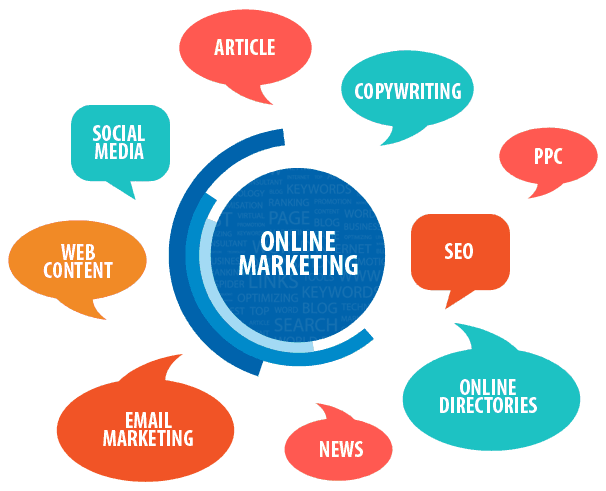Award-Winning Digital Marketing Agency Near Me for All Your Online Needs
The Function of Digital Advertising in Driving Client Engagement and Brand Commitment
In today's affordable landscape, the duty of electronic advertising in fostering client engagement and brand name commitment can not be overstated. By using targeted approaches that utilize information analytics and personalized material, brands have the ability to cultivate much deeper connections with their target market. This approach not just enhances consumer trust however also lays the foundation for continual brand name loyalty. The efficiency of these strategies frequently pivots on their flexibility to changing customer behaviors and preferences. What stays to be checked out is exactly how these evolving dynamics will shape the future of digital marketing and its effect on customer connections.

Recognizing Client Interaction
In today's digital landscape, comprehending consumer engagement is crucial for companies looking for to construct long-term relationships with their audience. Customer interaction refers to the interactions between a brand and its customers, including various touchpoints across electronic systems. This multidimensional concept goes beyond mere transactions, concentrating on developing meaningful experiences that reverberate with customers.
Central to effective client interaction is the capability to customize interactions. Making use of data analytics enables organizations to customize their messaging and offerings to fulfill individual choices, fostering a feeling of link. Energetic engagement on social media systems allows brands to react in real-time, dealing with consumer queries and worries, which boosts trust fund and commitment.
By analyzing these metrics, businesses can refine their methods to enhance consumer experiences. Ultimately, comprehending customer engagement is not simply regarding attracting attention; it involves supporting connections that drive lasting success.
Significance of Brand Loyalty
How does brand name commitment influence a company's long-term success? When consumers display commitment to a brand, they are extra likely to make repeat acquisitions, minimizing the cost connected with acquiring new clients.
Additionally, loyal consumers typically end up being brand advocates, promoting the brand through word-of-mouth referrals. These endorsements can significantly improve a company's reputation and draw in brand-new consumers without substantial marketing expenses. Additionally, loyal customers tend to be extra flexible of periodic bad moves, giving brand names with an opportunity to rectify issues without losing their customer base.
Moreover, brand name commitment can lead to raised consumer life time worth (CLV), enabling companies to spend a lot more in enhancing services and products customized to their dedicated group (Digital Marketing Agency). This cooperative partnership between customer commitment and brand worth promotes a competitive advantage in the market
Methods for Digital Advertising
Reliable digital marketing approaches are vital for businesses intending to prosper in today's competitive landscape. To improve customer engagement and construct brand name loyalty, organizations have to adopt a complex technique that incorporates various digital networks and techniques.
First of all, leveraging social media systems is crucial. By producing interesting content and cultivating two-way communication, brands can grow an area around their product or services. Furthermore, targeted advertising and marketing on these systems permits companies to get to specific demographics, improving the significance of their messaging.
Look engine optimization (SEARCH ENGINE OPTIMIZATION) is one more essential approach. By enhancing website material for online search engine, services visit boost their visibility, driving natural traffic and bring in prospective customers proactively browsing for their offerings.
Email advertising remains a powerful tool also. Individualized and segmented e-mail campaigns can support leads, re-engage non-active customers, and give useful material that improves client connections.
Finally, making use of analytics to recognize consumer actions and preferences is important. By analyzing information, businesses can fine-tune their techniques, making certain that they meet progressing client requirements and assumptions. Applying these approaches efficiently will not only drive interaction however likewise foster enduring brand commitment.
Gauging Interaction Effectiveness
Assessing the effectiveness of customer engagement approaches needs a systematic approach to measurement and evaluation. Secret efficiency indications (KPIs) play an important duty in quantifying engagement degrees. Metrics such as click-through prices, time spent on website, and social media interactions give valuable insights into exactly how consumers are responding to digital advertising campaigns.
In addition, qualitative actions, including customer comments and sentiment evaluation, can drop light on the emotional connection clients have with the brand. Surveys and focus teams can match measurable data, using a more thorough view of consumer assumptions and choices.
Engagement can likewise be measured with customer retention prices and repeat acquisition behavior, which show loyalty and contentment gradually. Digital Marketing Agency Toronto Ontario. Making use of tools such as Google Analytics and social media sites analytics systems allows brands to track these metrics successfully
Routinely assessing these data points enables services to adjust their see this website approaches, ensuring they continue to be straightened with consumer assumptions. Ultimately, a robust measurement structure not just educates future advertising decisions but additionally promotes constant renovation in consumer involvement initiatives, driving both brand name loyalty and lasting success in the electronic marketplace.
Future Trends in Digital Marketing
As digital advertising and marketing continues to advance, emerging patterns are influencing and improving the landscape exactly how brand names get in touch with customers. One significant pattern is the boosting assimilation of synthetic knowledge (AI) and machine understanding. These modern technologies make it possible for individualized advertising and marketing approaches by assessing consumer actions and preferences, allowing brand names to supply customized content and recommendations.
An additional fad is the increase of immersive experiences with increased reality (AR) and digital truth (VIRTUAL REALITY) Brand names are leveraging these innovations to produce interactive and engaging campaigns that captivate audiences, improving client experience and driving engagement.
Additionally, social commerce is gaining traction as systems like Instagram and TikTok present shopping functions, permitting customers to make acquisitions directly from their social feeds. This seamless assimilation of ecommerce and social networks fosters prompt consumer action and enhances brand name loyalty.
Furthermore, sustainability and honest advertising and marketing are coming to be critical in consumer decision-making. Brand names that show commitment to social responsibility and lasting methods are likely to build stronger links with their audience.

Conclusion
To conclude, digital marketing functions as a crucial force in enhancing client engagement and cultivating brand commitment. By leveraging customized web content, targeted marketing, and social media communications, brands can cultivate significant connections with their target markets. The integration of data analytics further permits for the improvement of advertising techniques in action to moving customer preferences. As digital advertising and marketing proceeds to evolve, its capability to drive continual growth and success for brand names will remain critical.
Customer involvement refers to the interactions in between a brand and its clients, incorporating different touchpoints throughout digital platforms. When consumers display loyalty to a brand name, they are more likely to make repeat purchases, lowering the cost linked with getting brand-new consumers.Moreover, faithful consumers frequently become brand name advocates, promoting the brand via word-of-mouth recommendations. Furthermore, loyal customers often tend to be a lot more flexible of periodic mistakes, providing brand names with a chance to correct problems without losing their consumer base.
In conclusion, digital marketing offers as a critical pressure in improving consumer interaction and fostering brand name commitment.